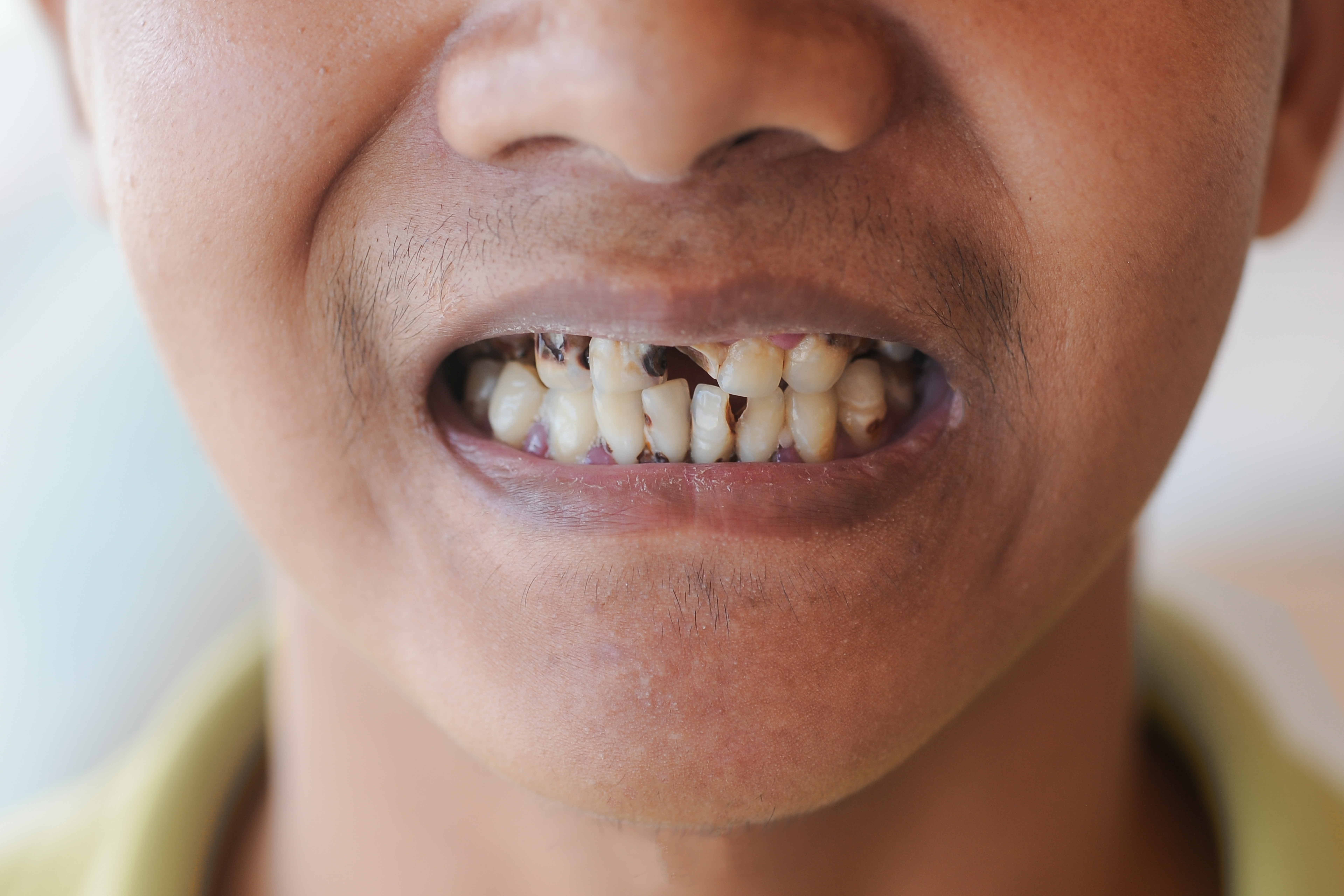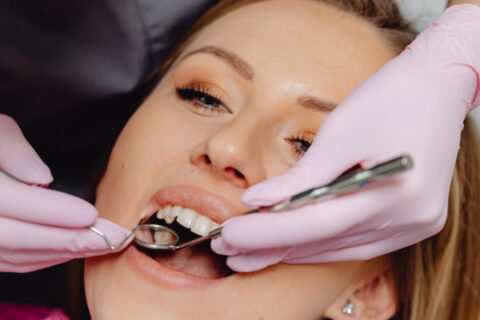How Do Dentists Fix a Chipped Tooth in Mishawaka?
Chipping a tooth is something that can happen to anyone, whether it’s due to an accident, a sports injury, or biting down on something hard. While it may seem like a minor issue, a chipped tooth can affect both your smile and your overall dental health.
In this blog, we will explore what to do if you chip a tooth, when to seek emergency care, how dentists fix chipped teeth, and why it’s important to visit a dentist at the first sign of damage.
If you are in Mishawaka and have a chipped tooth, McKinley Family Dental is here to help you restore your smile with expert care and the latest dental treatments.
What to Do if You Chip a Tooth
If you’ve chipped a tooth, the first thing to do is remain calm. Most chipped teeth are not immediately painful, but they can cause discomfort or sensitivity, especially if the chip exposes the underlying tooth. Here are the immediate steps you should take to minimize further damage:
- Rinse with Warm Water: Gently rinse your mouth with warm water to clean the affected area.
- Use Ice for Swelling: If you experience any swelling, apply a cold compress or ice wrapped in a cloth to the outside of your mouth or cheek near the chipped tooth. This can help reduce pain and swelling.
- Avoid Chewing on the Affected Side: If the chip is large or sharp, try to avoid chewing food on that side to prevent further injury or irritation to your gums.
- Preserve Any Fragments: If part of your tooth has broken off, try to keep the fragment and bring it with you to your dentist. In some cases, the dentist may be able to reattach the broken piece.
After taking these initial steps, it’s important to schedule an appointment with a dentist as soon as possible to assess the damage and determine the best course of treatment.
When Is a Chipped Tooth a Dental Emergency?
While most chipped teeth are not true dental emergencies, there are situations where immediate care is necessary. You should consider seeking emergency dental attention if:
- Severe Pain: If the chip exposes the nerve of the tooth, causing significant pain or sensitivity to temperature, it could be a sign that the tooth’s pulp is compromised. This requires prompt attention to avoid further infection.
- Visible Pulp or Nerve Damage: If the chip goes deep enough to expose the inner part of the tooth (the pulp), it can lead to infection if not treated promptly.
- Bleeding: If there is bleeding that doesn’t stop after applying pressure, or if the tooth is knocked out entirely, seek immediate dental help.
- Displacement: If the chip causes the tooth to become loose or misaligned, it could affect your ability to chew or cause additional discomfort.
In these cases, contact McKinley Family Dental right away to ensure the best outcome for your tooth’s health.
Do I Need to Go to the Dentist if I Chip My Tooth?
Even if your chipped tooth doesn’t cause immediate pain, it’s important to visit a dentist for a thorough examination. Here’s why:
- Prevent Further Damage: A small chip can worsen over time, especially if the tooth becomes weak or if it’s in a location where it’s prone to further injury.
- Avoid Infection: A chipped tooth can expose the inner layers of the tooth, making it more vulnerable to infection or decay if left untreated.
- Restore Aesthetics: A dentist can restore the tooth to its original appearance with treatments like bonding, crowns, or veneers. Ignoring it can lead to long-term cosmetic issues.
- Prevent Bite Problems: A chipped tooth, if not addressed, could affect your bite, leading to misalignment and other issues that may require more extensive dental work later on.
How Does a Dentist Fix a Chipped Tooth?
Dentists have various methods for repairing a chipped tooth, and the right approach depends on the extent of the damage and the tooth’s location. At McKinley Family Dental, our goal is to restore both the function and appearance of your tooth. Here’s how we might fix a chipped tooth:
Polishing & Smoothing
For minor chips, where only the enamel is affected, a simple polishing and smoothing procedure might be enough. After removing any rough edges, the dentist uses specialized tools to smooth out the tooth’s surface, making it look natural and feel comfortable again. This is often done for small chips that don’t affect the tooth’s overall structure or strength.
This approach is quick, non-invasive, and typically requires little to no recovery time, making it an excellent option for minor chips in teeth that are not visibly noticeable.
Bonding
Dental bonding is one of the most common ways to fix a chipped tooth, especially for small to moderate chips. In this procedure, the dentist applies a tooth-colored resin to the damaged area, molding it to restore the tooth’s original shape. The resin is then hardened using a special light, and the dentist shapes it to blend seamlessly with your natural teeth.
Bonding is a quick and affordable option, and it can be completed in a single visit to McKinley Family Dental. It is ideal for visible teeth and provides a natural-looking repair.
Veneers
If the chip is more severe or you are concerned about the aesthetics of your smile, veneers may be the best solution. A veneer is a thin shell of porcelain or composite resin that is custom-made to cover the front surface of the chipped tooth.
Veneers are durable, stain-resistant, and can dramatically improve the appearance of a chipped tooth, restoring its natural look and function. This treatment is perfect for those looking for a long-lasting and aesthetically pleasing solution, especially for front teeth.
Crown
When a chip is extensive, and the tooth’s structure has been significantly compromised, a crown might be necessary. A crown is a cap that fully covers the tooth, restoring its strength and shape. Crowns are particularly useful for molars and teeth that endure a lot of pressure while chewing.
A crown can be made from porcelain, metal, or a combination of materials, and is designed to blend with your natural teeth. This treatment is ideal for patients with large chips or cracks that affect the tooth’s functionality.
Root Canal
If the chip has exposed the tooth’s pulp and caused an infection or significant pain, a root canal may be necessary. During this procedure, the dentist removes the infected tissue from inside the tooth, cleans the area, and then fills it to prevent further infection.
Don’t Delay Seeing Your Dentist for a Chipped Tooth
Delaying treatment for a chipped tooth can lead to several complications, such as:
- Further Decay: Exposed areas of the tooth are susceptible to decay, which can worsen over time and lead to the need for more invasive procedures.
- Infection: A chipped tooth can expose the inner pulp, leading to a higher risk of infection. Infections can spread to other teeth or surrounding tissues if left untreated.
- Aesthetic Concerns: A visible chip left untreated may affect your smile and self-esteem, leading to additional dental procedures later on.
At McKinley Family Dental, we recommend seeing a dentist promptly to avoid these issues and ensure the best possible outcome for your dental health.
Conclusion
Chipping a tooth can be alarming, but with the right care from your dentist, you can restore both the function and appearance of your tooth. Whether the chip is small or large, there are various treatments available to fix the damage and help you get back to smiling with confidence. If you’ve chipped a tooth in Mishawaka, don’t hesitate to contact McKinley Family Dental for expert care and a solution tailored to your needs.
Frequently Asked Questions
- What happens if I don’t go to the dentist after chipping my tooth?
If you don’t see a dentist after chipping a tooth, the damage could worsen, leading to infection, further decay, or cosmetic issues that may require more expensive treatment down the road. - Can a chipped tooth heal on its own?
A chipped tooth doesn’t heal on its own. Professional dental treatment is required to restore the tooth and prevent further damage. - How much does it cost to fix a chipped tooth in Mishawaka?
The cost of fixing a chipped tooth varies based on the severity of the damage and the treatment required. At McKinley Family Dental, we offer affordable options for all budgets. - Will a chipped tooth affect my ability to eat?
A chipped tooth may cause discomfort when chewing, especially if it exposes sensitive areas. However, treatment will restore your tooth’s function and alleviate discomfort. - How long does it take to fix a chipped tooth at the dentist?
Minor repairs like bonding or polishing can often be done in a single visit. More complex treatments, such as crowns or veneers, may require multiple appointments.


